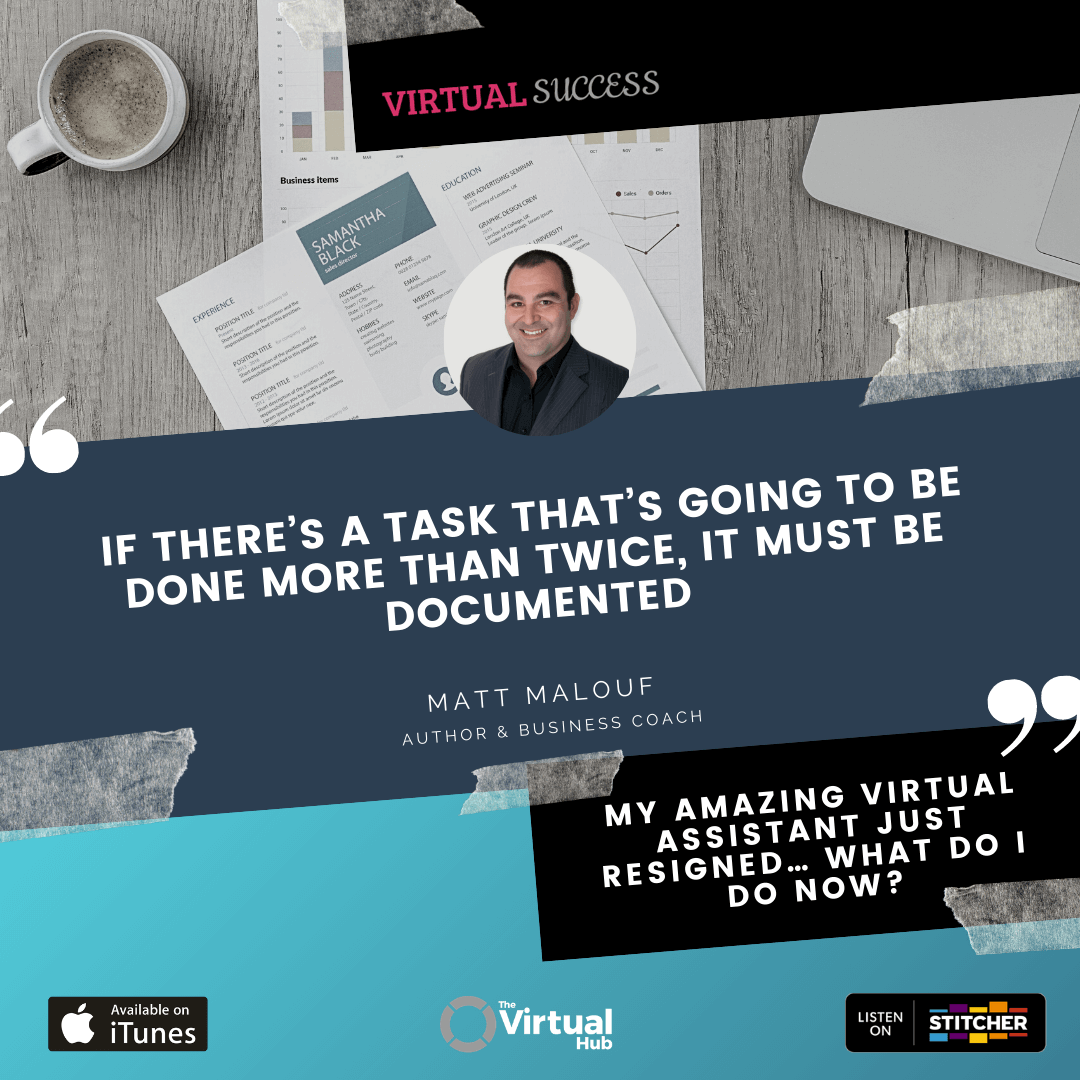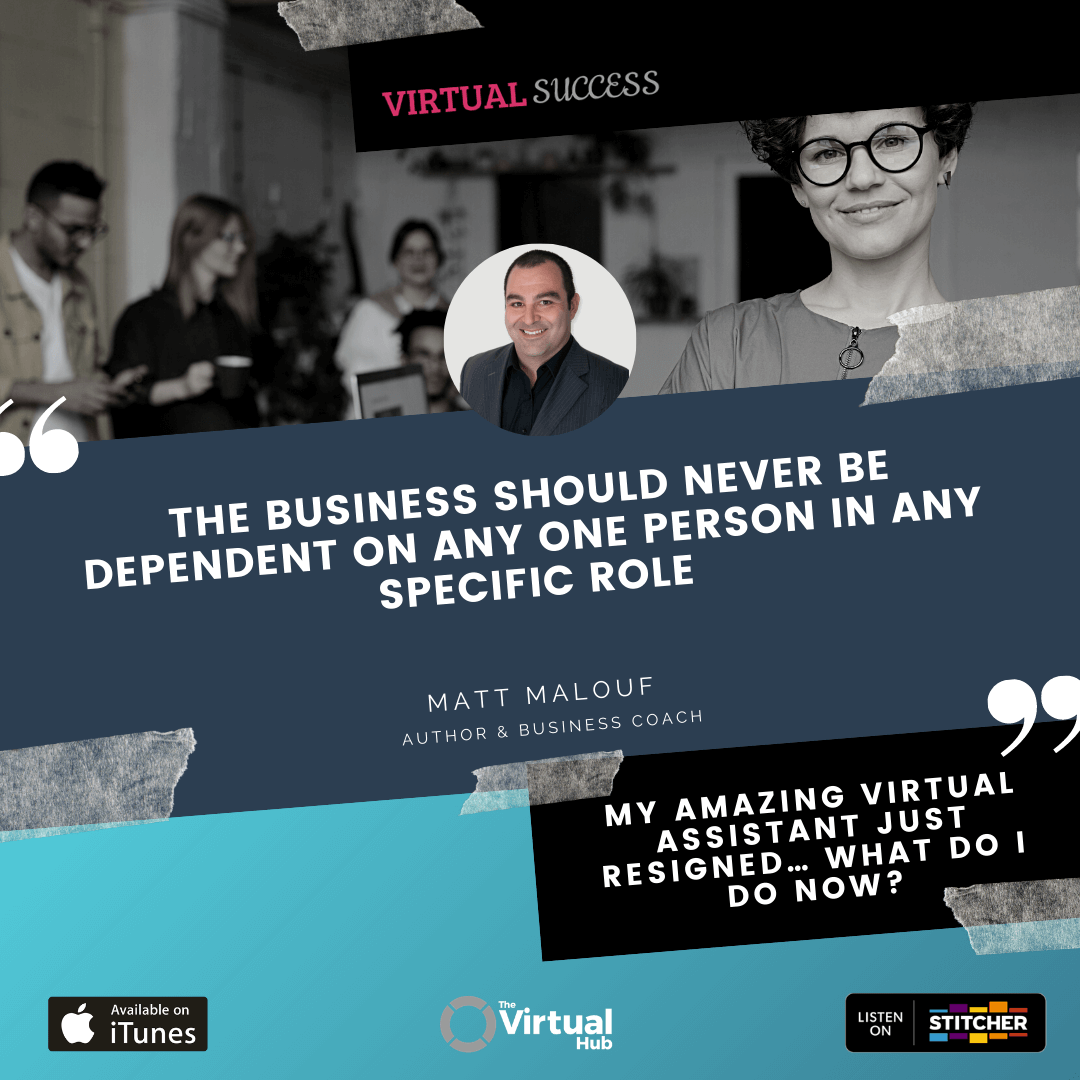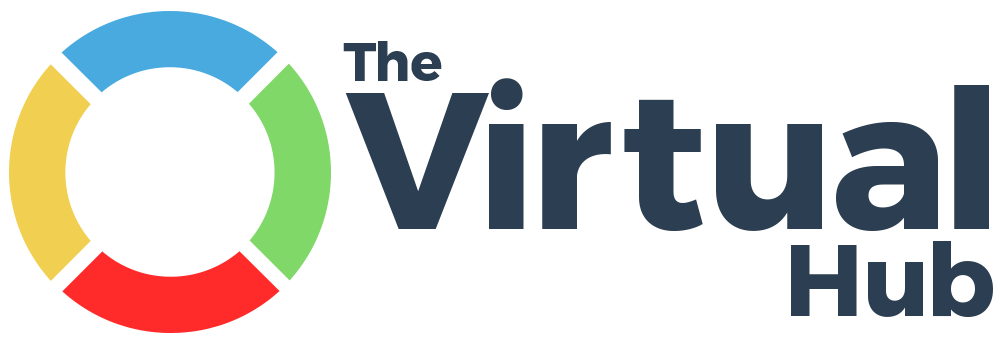My Amazing Virtual Assistant Just Resigned …What Do I Do Now?
Want the transcript? Download it here.
In this episode, Matt and Barbara discuss the reasons why business owners should never become dependent on any one person in any specific role and the common traps many fall into in this area.
This episode focuses on some of the key areas that business owners need to stay on top of to ensure there is minimal impact to their business when that superstar VA leaves.
Some of the areas covered include:
- The need for up-to-date and current systematisation and documentation
- Understanding that you need to slow down, in order to speed up your business
- It is the responsibility of the business owner to build and create the systems to ensure business success
Let us know what your key takeout has been from this episode and join the continuing conversation over in the Virtual Success Facebook Group.
Resources mentioned in this show:
In this episode:
00:54 – My VA just resigned…
02:05 – Creating a turn key business
02:56 – You must document tasks
05:05 – Everybody is replaceable, including you
06:28 – Slow down to speed up
10:40 – Key takeaways
12:57 – Wrapping things up
Barbara: Hey everyone and welcome back to another episode of the Virtual Success Show, where I’m joined by my co-host, Matt Malouf. Hi Matt, how’s it going?
Matt: Well Barb, and yourself?
Barbara: I’m really well, thank you. We’ve been flat out busy, both you and me in the last few weeks, up-leveling.
Matt: Absolutely. And braving that it’s very chilly here in Sydney today, but …
Barbara: It is.
Matt: But we’ve got a hot topic that we’re going to be talking about.
My VA just resigned…
Barbara: Yes, definitely, definitely. One of the questions … I mean, I hear this quite a bit at Virtual Angel Hub, but I also see it online and I’ve heard it from people I’ve spoken to, who’ve had VAs or virtual teams before, what if my … Let’s say you have an amazing VA, that just does epic work for you, is a massive asset to your business, and then they tell you that they’re resigning for whatever reason, they may be going back to study, or whatever. They’ve announced you that they’re resigning and you go into this total panic mode of, “Oh my god, what am I going to do now?” because this person is such a huge part of my business and knows all the processes and what we do.
And I find this really interesting, because in my business, I often move people around, I promote people. Thankfully nobody’s ever really left me, but people often very quickly have to be moved into new roles, which means that I can’t have a situation where they’re indispensable in the previous role.
So Matt, I’m really interested to talk to you about this as a business coach. How can people not fall into this trap of having somebody who is indispensable, I guess, in their business, and then you’re left in chaos if they leave?
Creating a turn key business
Matt: Yes. It was a really interesting conversation we were having just before the show, but I think that the person that put this best is probably Michael Gerber in The E-Myth, about you’ve got to create a turn key business. A business that can operate without you.
And I think that anytime in business, where knowledge is held with a person, without documented systems or processes, it’s risky. And I know Barb, what I see, a lot of these business owners holding a lot of the IP in their head, and doing things just naturally in the natural course of business. Then they bring a team member on, and what they do is they download their brain into the team member’s brain, without getting it all documented. So really what you’re doing is transferring the risk, as opposed to de-risking the business.
You must document tasks
Barbara: Yes. And you know what I find as well? Sometimes when a client comes to us, and we have a very high success rate as you know, and sometimes the client gets the VA and they’re just blown away. Not always, but often in cases they can be blown away by this person, and they get really excited and just dive straight into the work. And the VA starts doing massive, epic work for them, and they forget that actually still it’s probably a good idea, in fact, it’s definitely a good idea to still pause for a bit, so that you can get your operational thing documented in such a format that you can grow, and that you can then promote that person and slot another person into the role very quickly, or if they leave in this case, that you’re not in chaos.
Matt: Absolutely. One of the rules we have in our businesses is that if there’s a task that’s going to be done more than twice, it must be documented. It must be documented, even if it’s just a simple little task, because it enables me to sleep well at night knowing that if someone chooses to leave, something happens, whatever it may be, that there’s a written documented process that somebody else can slide into. And it may be that it takes them a little bit longer, or there’s a bit of retraining and the like, but that’s actually the value in your business.

I think it was one of our early shows Barb, when we had Dan Norris. I think he said that the responsibility of the business owner is to build and create the systems or the machine, which is the business. And this is how you limit the impact of an amazing person leaving.
The reality is, if you’ve got an amazing person in your business, and as you said earlier, for whatever reason they choose to move on, that’s always going to hurt. They’re bringing value, they’re probably an enjoyable person to work with and alongside, so that’s always going to hurt. What you don’t want is for you to feel like your business is going to come crashing down, or to a screaming halt, because this person moves on.
Barbara: Absolutely, yes.
Everybody is replaceable, including you
Matt: The business should never be dependent on any one person in any specific role. The mindset to adopt here is that everybody is replaceable, including yourself.

Barbara: Yes. And I think you’ve made a very valid point there, that if you want to … I mean, a business is an asset, and you’re supposed to … the idea of building a business is not just building an income stream, you’re building a valuable asset, that even … and actually Michael Gerber says this in his book, that it should be built like something that can be easily sold or franchised out 5,000 times, even if you never intend to do that, because that is the value of the asset.
And if you have people in roles that they own all the IP … I mean, obviously they can be specialists in that, but it is much better to actually create the business as its own entity and people can slot in and out in different areas pretty easily.
I mean, I think that’s pretty easy to do, personally, but it does take a sense of … If you can’t slow down … Let’s say people that are just running a million miles an hour and they’ve hired a VA and it’s going great, well, what I would say to those people is potentially then, maybe you allocate two hours a week where you guys sort of just recap on the things that were done for the week and try to at least make a list of things that need to be documented, and then start the process of slowly chipping away at them, and every week doing one process map. That can actually work over six months.
Slow down to speed up
Matt: Absolutely. And I think also to … And you’ve mentioned it a couple of time, it’s in that slowing down. I think at times we are moving so fast forward, that we don’t realise that there is actually power and speed in slowing down.
When you take the time to document and systemise, what you’ll find is number one, you’ll get efficiencies in the process. In reviewing and documenting your processes, you’ll see that there’s better and faster and more efficient ways to do things.
Secondly is, things can be replicated a lot faster and more consistently so the delivery of your product or service is going to be more consistent, which is going to lead to happier customers, which is probably going to lead to greater referrals and bigger business growth.
And it’s counterintuitive thinking that it happens time and time again, and when you commit the time to making this happen, it does produce dividends.
Barbara: 100%. And as you were talking, I was thinking to myself, the majority of people, actually including myself even though I don’t mind creating processes, but I would probably prefer sticking needles in my eyeballs than do it, because most people feel that way about doing it.
And I was actually speaking to one of your clients recently. He said to me, “Oh my god Barbara. I’ve just spent the last month putting all … nailing down processes. And I’ve been stuck in my cave just doing systems and processes and I’ve hated every second of it.” And he said, “But the funny thing is, since that moment, I’m spending massive amounts less time in the business, and I’m now freed up to spend time on the business than ever before.”
So, listeners out there, we know, this is actually not particularly an enjoyable exercise, but if you’re running a business, the reality is that you’re building something, otherwise you’re just running a job, as we’ve said many times before.
And while sometimes income is your biggest driver, especially in the early days when you try to keep income going, you need to carve out a little bit of time somewhere in your week, to focus on building this what I call, “Internal leverage” in your business so that it can be leveraged, the machine itself can be leveraged. Then later, through sales and marketing, all the things that you’re going to do to actually grow it, otherwise you get the bottle necks when you try and grow.
Matt: Absolutely. And it’s interesting, part of what I wrote about in the Stop Doing List book, was around that KRC model, the knowledge, responsibility and control, and talked about how the person who has the most knowledge about a task or area of the business can be responsible and hence control it.
If you want to prevent the boomerang of these tasks having to come back to you if someone moves on, having systems in place and then documented training processes to train people in the systems, is going to enable you to move quickly to insert somebody else into that role, train them up and ensure that those tasks don’t come back to you.
Barbara: Absolutely. We’ve had a situation a while ago, where a client did fall into this kind of … I mean, you know, it’s a very common trap that clients fall into, and the particular VA did decide to move on. And that person just couldn’t … and we’ve got a lot of success in transitioning to new VAs for clients that go through this kind of transition. We’ve got a whole transition process and support thing for the client, but this client in particular had avoided this for so long, that we can’t even do a transition. And they’ve gone into total panic and decided that they just don’t want another VA and they’re just going to go back to doing it themselves, which is very sad for us to see, because that person is going to go through another year probably, of pain to try to … and just peddling and all the things we don’t want to be doing in business.
It’s a huge lesson when it happens to you, if somebody leaves you like that, but it’s probably a painful lesson to learn. But if you see the lesson in it, people can move on and create a better business actually from learning it.
Key takeaways
Matt: Absolutely. I think if we would just talk about a few key takeaways today Barb, I think for me, number one is to minimise the impact of a great person in your business moving on, you’ve got to have documented systems that are used. I know a lot of companies will have documented systems, but they’re never referenced, they’re not up to date, and hence they’re actually irrelevant when it comes to trying to get somebody into that role again. I think number one is up to date and current systematisation and documentation.
I think number two is understanding that you need to slow down in order to speed up. And if you don’t make the time, or take the time to document and unpack every single role in the business right down to the simplest task, then you’re exposing yourself and when somebody leaves, and it’s inevitable, people grow and move and you not going to be able to support this person on their career path forever, so it’s inevitable that people will leave and move on. You want to be prepared and feel bulletproof to that.
And for me, number three is really that point of if the task is going to be done more than twice, it should be documented for somebody to be able to pick it up and run with it.
Barbara: Absolutely. And I was thinking as you were talking there, that I think the reason a lot of clients avoid that sort of thing, is because, like I said, most people don’t like doing it. It’s not the enjoyable part of the business, but it eradicates the other less enjoyable things that happen later, if you just knuckle down and do this. And it is actually an essential part of building a business whether people like it or not. That is the … some of the tasks involved in building an asset or building something that is a business that works, not necessarily without you, but isn’t so reliant on you, or reliant on any particular person. And as you talk about it a lot Matt, it makes it a more valuable asset in the end, for those people who are looking to build something that is scalable and saleable.
Matt: Absolutely.
Barbara: Yes.
Matt: Absolutely.
Wrapping things up
Barbara: Matt, that’s been great. Like I said, this is a common thing I see online, people commenting about it, I hear about it, we’ve got clients that go through it, and we just … it becomes frustrating, I guess, for me and I’d say for you as a coach, when you keep telling people this, but sometimes they don’t realise until it happens, how important it is to do this before it happens, and to get organised.
And I would even suggest to some people, if you’re looking to bring on a VA or a virtual team, or start this outsourcing thing in particular, I would actually advise, you might be better off deploying your cash and your resources and your time initially for a couple of months to get this stuff right, before you even bring someone on, because otherwise it’s chaos when they come in.
Matt: Absolutely. Or the other part of that, which is probably option two to what you’re talking about there, is understand that in the initial pieces of the engagement with a person, that their time is going to be heavily spent unpacking your brain, and putting it on to paper.
Barbara: And that can be three months, easily.
Matt: Correct.
Barbara: Easily three months of actually just unpacking, so yes, it’s being realistic about that.
Guys, if you’ve got any comments on this, or if you’ve gone through this yourselves, we’d love to hear about it. You can let us know over on the Virtual Success Facebook group. If you want to join that, the conversation’s going on over there. Or leave us a review and a rating on iTunes and you can comment there. We’d love to hear your thoughts on this particular situation, or on any other shows that you’d love us to do.
Matt, I think that’s a pretty good short and sharp show for today.
Matt: I think so too.
Barbara: Thanks guys.
Matt: Thanks everyone. Bye bye.
The Hosts
 Matt Malouf
Matt Malouf
Matt Malouf is a passionate business coach, speaker, author and entrepreneur on a mission to help entrepreneurs around the world break the shackles of mediocrity and reach new levels of personal and business success.
 Barbara Turley
Barbara Turley
Barbara Turley is the Founder & CEO of The Virtual Hub, a company that specializes in recruiting, training and managing superstar ‘Virtual Assistants’ in the social media, digital marketing and systems automation space.
